23 Helping Verbs List

What Are Helping Verbs? (with Examples) A helping verb (which is also known as an ) sits before a main verb to help express the main verb's,,. Be, do, and have are the most common helping verbs. You will see them in these forms: Be: am, is, are, was, were, being, been Do: does, do, did Have: has, have, had, having Modal helping verbs (or modal auxiliary verbs as they are more commonly called) are also helping verbs. The modal auxiliary verbs are can, could, may, might, must, ought to, shall, should, will, and would.
23 Helping Verbs Song

(These never change their forms.) Examples of Helping Verbs Here are some examples of helping verbs expressing (main verbs in bold): • She has been writing since breakfast. • They were waiting for a bus with a good-looking driver. • Johnathan will have sung by then. Here are some examples of helping verbs expressing: • Your dinner has been given to the dog.